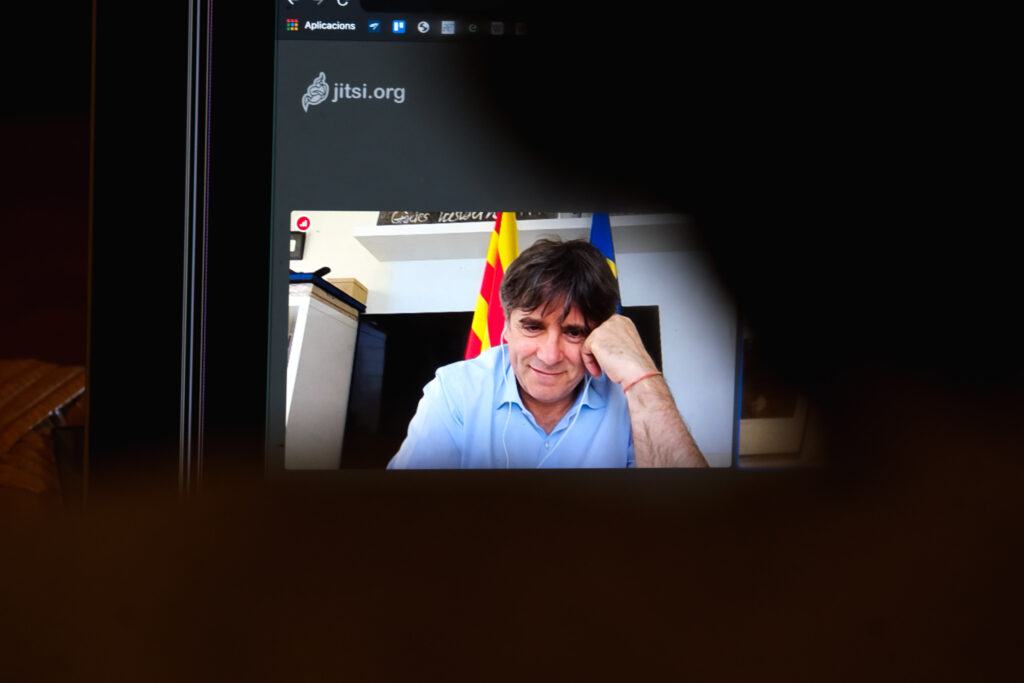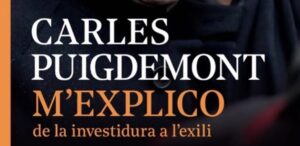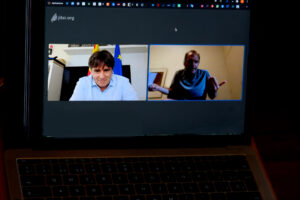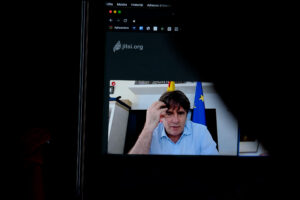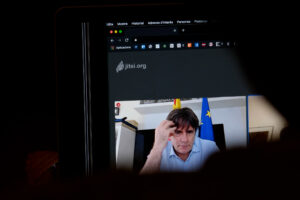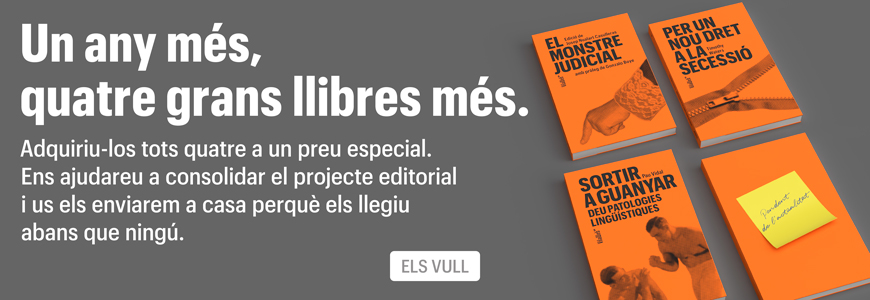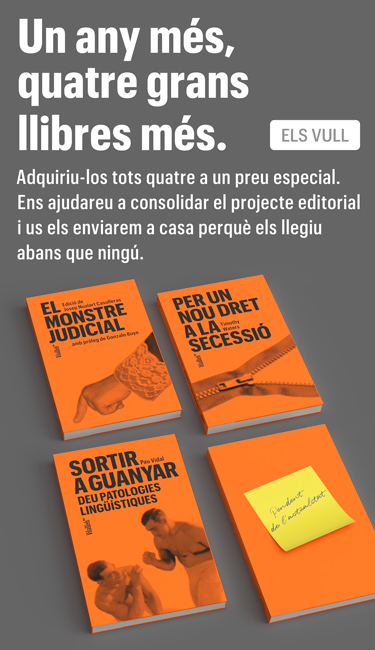24.07.2020 - 09:06
|
Actualització: 24.07.2020 - 11:06
Exiled Catalan president Carles Puigdemont (1962) has just published the first volume of the journal he has been keeping since before the 2017 independence bid. The book —titled M’explico. De la investidura a l’exili [My Story. From Inauguration to Exile]— is nearly 700 pages long and it covers 2016 and 2017 in diary format, told through Xevi Xirgo, the journalist which the president met on a weekly basis during that time. It is a notarial opus, crammed with information, data, engagements and meetings. The book does not posit a thesis; instead, it is a comprehensive journal with daily entries that allow the reader to watch the events unfold through the eyes of the president, almost in real time. We discuss the book with its author in an online interview, while we await volume two, La lluita a l’exili [Struggle in Exile], which is scheduled for publication in a few weeks’ time.
—What sort of things do you expect your book to shed light on?
—There’s been a full-on attempt to pit the political leaders who stayed in Catalonia against those of us who went into exile. And to provide a muddled account of our flight to exile so that suspicions or even direct accusations could be cast in our direction: the notion that leaving behind [our colleagues] was an act of treason and that we chose to leave them high and dry rather than face the consequences [of our actions]. I needed to tell my own story and defend myself.
—You say you stopped trusting [VP] Oriol Junqueras early on, when he did not inform you of his meetings with [PSOE leader] Pedro Sánchez and Ximo Puig, [the president of the Valencian regional government]. You write that you and Junqueras did not see eye to eye and you struggled to read him.
—In my book I explain that we must remain completely loyal to ourselves and I could sense that my loyalty was not being reciprocated. That was a concern, not in itself, but in terms of the overall consequences it might have led to. However, on 1 October 2017 [the date of the independence vote] I did receive the trust I was looking to get. Any other differences must be spelled out, as they might help to explain certain decisions or public statements, but they weren’t a deciding factor inasmuch as they didn’t prevent the referendum from going ahead.
—Reading your book, you can’t help but wonder if you will ever be able to trust Junqueras again.
—We must never lose political trust. Otherwise, we wouldn’t engage in politics. I don’t like to dwell on any outstanding issues that Junqueras and I might have. I just want to make sure they don’t get in the way of the general objective. There are no personal feuds, here.
—In your book you say that you first entertained the possibility that the Spanish authorities might be able to stop the independence vote on September 13 [2017]. That was very late, wasn’t it?
—We were duty-bound to consider what might happen if they managed to thwart our efforts. Even though there was much speculation and nervousness, we were certain that the referendum would go ahead.
—The book shows that you remained hesitant and undecided throughout October 2017. You kept changing your mind. That’s a welcome insight. For example, at one point you justified calling a snap election because fewer than 50 per cent of the electorate had turned out to vote. I don’t think you would say that sort of thing today.
—I must stay true to myself. I didn’t want to write a conveniently airbrushed memoir, tucking this away and leaving out certain bits. Not at all. That makes my book more factual. We are human beings, people with faults and weaknesses. Showing yourself the way you truly are is not an evil in politics. Having said that, it’s hardly a contradiction: I remember using that argument on October 26 in a meeting with my party’s MPs: the looming confrontation with the Spanish state was not the sort that we were ready for. It was of a different kind. We knew how a Catalan republic might have come to be in a scenario where both sides stood their ground but without a violent confrontation. This meant that decision-makers like myself felt a different sort of responsibility. Furthermore, it was obvious that the international community would take issue with the referendum’s turnout: lower than 50 per cent. To me that doesn’t make it less valid. If you look at the turnout in the Brexit referendum, Catalonia’s charter, Spain joining NATO or the European constitution, you will see that the turnout for all those votes was lower than on October 1. So, that’s not what I meant. My point was that if we were to hold our ground and face off with a state that was willing to resort to violence, it would be a different ball game. That’s when I put forward a number of arguments to my MPs, which some people who opposed them at the time have embraced now.
—Fear of the conflict. Fear of the body count. How do we get over the fear of confrontation? That played a key role in 2017. It could do so again. How can we prevent that from stopping us again?
—Fear is a normal thing. And when someone is faced with a conflict that might involve violence and casualties, it’s only natural that they feel afraid. I always will. Anyone who is not afraid to engage in a conflict that might result in casualties is a reckless fool. I didn’t want to carry that burden. Today we can safely say that the legacy of Catalonia’s independence referendum remains intact and it provides the reason for trying everything in order to achieve independence. If we had paid a price in human lives, we might still have ended up where we are today: in jail or exile. That has a bearing on the independence process. Any leader should be afraid of that sort of scenario. What we must ask ourselves is what we ought to do when the time comes.
—And what would that be?
—I’ll keep that to myself. But —when it comes out— I suggest you read Preparem-nos [Let’s Get Ready], a document written by the Council for the Republic. If the only viable path to independence that Spain leaves us is to enter into a conflict, the lessons from 2017 will prove very useful. However, we must abide by our maxim, our ethical commitment: we mustn’t resort to violence. Violence and active resistance are two very different things. Every day we must ask Madrid if they are willing to renounce violence in their attempt to stop Catalan independence, the same way I am willing to do so in order to achieve it.
—On 10 October 2017 the only leader who argues that you must honour your promise of a unilateral declaration of independence is [exiled minister] Clara Ponsatí and, to some extent, Lluís Puig [another exiled cabinet member]. Both ministers had only been appointed recently. Ultimately, the declaration was delayed for several days. What kind of political leadership do we have, that only the latecomers are able to draw the right conclusions?
—Sure, of course. You can’t claim that all of us knew what had to be done. Likewise, the others did not find it easy to back me up. There were many doubts, indeed. Once they saw my determination, the rest of the cabinet came around. Ultimately there was a well-defined window of opportunity to engage in an unprecedented dialogue with Spain and I felt compelled to explore it. While I will admit that [suspending the declaration of independence on] October 10 was a mistake, I can assure you that it also provided a learning opportunity. It would be a mistake not to extract a lesson from it.
—What lesson is that?
—The lesson to be learnt from 2017 is that, even at critical times, when Madrid speaks of dialogue, we mustn’t believe a word they say. We’ve got to learn that and avoid making the same mistake again. This is a lesson I offer to the future generations: they must realise that the Spanish state is a con man. There’s a lesson for any future dealings with Spain.
—Let’s talk about your book’s supporting cast. For instance, [former Catalan president] Jordi Pujol, who advises you to declare independence as a government, but not in parliament, and then call a snap election. It is a commonly held belief that Pujol wanted to cool things off, but he stood by your side and encouraged you to go all the way.
—Since the Spanish government, rather irresponsibly, was unable to rise to the challenge posed by such historic developments, there was no other conclusion. Nothing else could be done. The step had to be taken. In the Catalan dossier, those days marked the foundation of an independent republic. It might seem distant and far-fetched now, but when all this is over and we go through that dossier, the foundational documents will include the declaration of 27 October 2017.
—Quim Arrufat was your man in the CUP, [the far-left separatist party].
—He was, although he wasn’t the only one. He was one of the conduits. I believe the CUP made an effort to come together and conduct themselves in a loyal manner.
—César Alierta, the chairman of Telefonica. He lost his job because he tried to mediate in the Catalan conflict.
—Apparently so. That’s the impression I got from him. I never knew the exact details of the deal, but I have witnesses who tell me that the Spanish government agreed to something before the non-binding vote on 9 November 2014. The agreement was between then-Spanish PM Mariano Rajoy and his Catalan counterpart, Artur Mas. Following Spain’s time-honoured political tradition, the Spanish government went on to disregard that deal. It’s significant that someone like Alierta —who opposes Catalan independence— should mention it.
—You have praised Álvarez-Espejo, a Spanish general who said that the Spanish military should refrain from intervening in the conflict between Catalonia and Spain.
—I have. I’ve only ever met a handful of high-ranking Spanish military officers and I have to say they struck me as professionals who believed in democracy. They strived to emphasise that the role of the military in a European state is at odds with what the Spanish army had traditionally done. In this particular case, he was not your plotting type.
—Keep going, president Puigdemont, said a Guardia Civil officer.
—On the subject of the Guardia Civil, I’ve had a number of arguments with people who couldn’t understand that I had no trouble accompanying them to celebrate October 12th [Spain’s national holiday] when I was the mayor of Girona city. Unlike Spain’s National Police, some Guardia Civil officers have settled down and started a family in Catalonia. These people should feel that an independent republic would be theirs, too, even if they don’t root for it.
—It is surprising to see how many people lean on you, always in the same direction [in October 2017]. One of the few exceptions is Antoni Abad, the chairman of CECOT [an employers’ group]. To what extent did you give in to all that one-sided pressure encouraging you to cool things off, as opposed to holding your ground and calling to civil disobedience?
—My government was pro-independence and I didn’t need any nudging in that direction. It’s only normal that some tried to balance that out. But I am sure that if the Spanish government had agreed to my conditions for calling a snap election, independence supporters would have applied a great deal of pressure, too. I am certain of that.
—The king of Spain: in your book you write that at first he seemed more open-minded than Rajoy.
—On the few occasions we had met, the king was a straight-talker who seemed abundantly informed and well-documented. He even showed more interest in us than Rajoy. Until 3 October 2017 I thought that in any parliamentary democracy the king was supposed to mediate at a time of constitutional crisis. Any hope we might have had that the king might take on that role was blown away [by his speech on tv effectively sanctioning police violence during the vote two days earlier]. His father, king Juan Carlos, appeared on tv wearing his army uniform to make a civil address [when the military staged a coup on 23 February 1981]. His successor to the throne did the exact opposite. It was a catastrophe. I actually chose not to watch it live and, instead, analysed the message with a clear head afterwards.
—You mention several countries that might have welcomed you as exiles: Switzerland, Belgium, Norway and Uruguay. Uruguay?
—I never considered that option. It must have been on some paper and someone made a call. But I never contemplated moving to a country where I could avoid extradition. Belgium was our top candidate.
—In your book you seem sick and tired of the political strains within the PDECat. And your disagreements with Marta Pascal, the then-PDECat leader.
—It would have been naive to assume that such extreme, extraordinary circumstances would be stress-free. There’s always some strain and there’ll be more in the future. It’s normal. The crux of the matter is not to avoid tensions but to overcome them. And to keep a clear head in order to make the best decisions: essentially, the sort of decisions you will be able to explain later, even if they prove wrong.
—Artur Mas is one of the leaders you trust the most.
—I do, because he has shown me that I can trust him.
—He has said nothing about your new political party, Junts [Together]. He’s keeping quiet about it. What do you make of that?
—I’ve not said much about it myself, not publicly. I’ve not made many statements on the subject. Mas and I strive to preserve the spirit of Convergència Democràtica in 1974, a new party that managed to bring together Christian democrats, social democrats, some that came from the PSUC [the Catalan communist party], and even others who held office in the Franco regime. Neither Mas nor myself like to throw out the baby with the bath water and sometimes silence must be understood in those terms: building and preserving.
—I expect the rival team to play rough. They did so on the day of the referendum. Do you?
—I do. That’s why I’m in Belgium. This is not an even fight: we are facing a state that will stop at nothing. They’ve said it themselves. Remember what [former Spanish VP] Alfredo Pérez Rubalcaba said: we will pay the price, no matter how high. And they have: just the purchase of a Pegasus spyware license will set you back €250m. Not to mention [the violence on] 1 October 2017. We need to take that into account: our opponent will go to any lengths and won’t flinch at the price tag. We used to be certain about it, but now we have actual records of it: precious information that tells us that the state may indeed be tempted to resort to violence. However, that temptation reveals a weakness, an intellectual laziness that stops them from coming up with a complex solution. And that affords us an advantage.
—Is there anything else you’d like to add?
—I ask readers not to approach my book in haste. And, at the end of it, people should draw their own conclusions like mature grown-ups who have been presented with all the facts. We mustn’t think that if we appear in a more positive light, readers will conclude that we are very good. Not at all. We must furnish them with the elements they need to draw their own conclusions and have another go at it. In fact, that’s what we are doing. And it is essential for us to describe our strengths and weaknesses. A SWOT test: strengths, weaknesses, opportunities and threats to help us prevail when we next face the wall that Spain has built for Catalonia.
—The SWOT analysis that you include in your book is impressive. All we had [in 2017] was the people. We couldn’t even count on the Catalan police force. You say that yourself.
—And we won’t be able to in the future. That’s one of the issues my book deals with: I never asked the Mossos, the Catalan police, to join me. I feel very strongly about the deliberate attempt to criminalise our police force and take away their powers. All accusations that they undermined the Spanish state are baseless. It is not fair. In the 21st century world, where we have a tool that is likely more powerful than a police force [he pulls out his mobile phone], do we really need to strain our police in order to control the territory? Ultimately, it’s about controlling people. Not just physical control, but controlling people. We must be able to prepare to control the territory and be ready when we next come up against the wall that Spain is always ready to put up.
